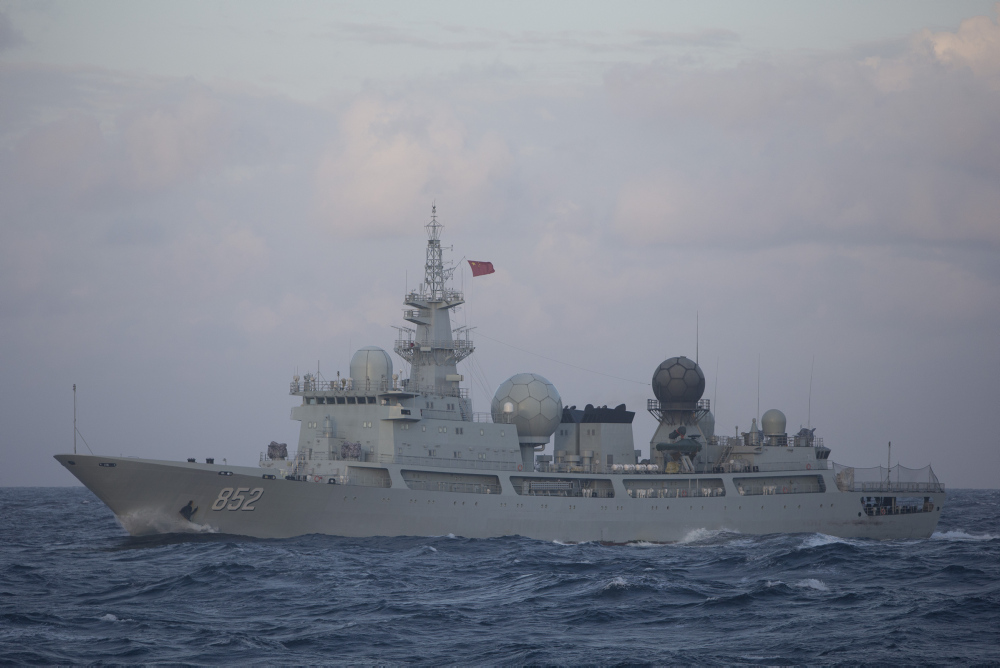
The most obvious response to the Chinese intelligence-gathering ship snooping around in Australia’s Exclusive Economic Zone in the Coral Sea would have been to put a RAAF P-3 maritime patrol aircraft right over the top of it. There’s nothing the Five Eyes countries won’t already know about the electronic eavesdropping capabilities of the 6,000-tonne Type 815 Dongdiao-class vessel, but that’s no reason not to add more information to our emissions libraries and to give the ship’s crew something to think about.
A second, slightly more lateral, response would have been to publish imagery from the P-3 so that the Australian community would have an idea what China’s newest intelligence-gathering vessel looks like.
A third and even more interesting step would have been to invite the ship to make a port call. Why ever not? The Port of Darwin is lovely at this time of year and the Type 815’s crew would surely have relished some fish and chips on the wharf. We could have asked the ship’s captain for his thoughts about ‘options for joint operations to combat cybercrime’—a commitment entered into at the inaugural Australia–China High-Level Security Dialogue in Sydney on 24 April.
Defence hasn’t said if they did a flyover, but such is the phobia about doing or saying anything about Chinese national security posturing, we are unlikely to ever know. As for the sharper and slightly more lateral responses, #forgeddaboutit! We are so nationally spooked by China right now that we don’t know how to talk about the place, let alone how to deal with its more assertive behaviour. According to an ABC report, some unnamed Defence officials referred to the presence of the spy ship as an ‘unfriendly’ and ‘provocative’ act. But in other respects, the ship’s presence—hardly unusual in maritime affairs—earned the mildest of rebukes.
Here’s an interesting footnote to the spy vessel story: the Australian media started reporting early on Saturday 22 July that the vessel had been ‘spotted “in the vicinity” of the Talisman Sabre 17 war games’. The Type 815 is a modern vessel, not Dr Who’s Tardis. It would have taken days to position itself in the Coral Sea and we would (or should) have been tracking its passage. But its location didn’t become public knowledge until some days after Defence issued a media release (on Wednesday 19 July) saying that ‘this week Defence hosted General Wei Liang, Political Commissar, Southern Theatre Command from the Chinese People’s Liberation Army (PLA) on a recent goodwill visit to Australia’.
How convenient! Such good will! No need to let the arrival of the spy ship complicate General Wei Liang’s five-day visit from 15 to 19 July. There’s no hint that the spy ship’s activities were raised with the general, but the media release did make the happy observations that the visit ‘provided an opportunity to exchange views’, that ‘a meaningful discussion’ was held and that the visit helped ‘foster transparency between the Australian Defence Force and China’s People’s Liberation Army’. Truly?
Unfortunately, transparency with the Australian public wasn’t fostered because it has become the norm for Defence to announce the visit of Chinese generals only after they have left. It seems it’s only safe to put out a media release once the wheels are up on the departing flight.
To be clear, that media approach is directed by the Chinese when negotiating visits. The Chinese insist on their generals not going anywhere near the Australian media, but they also want access for their own rather more pliant journalists. There are extensive demands for senior visitors to meet the prime minister and ministers; for use of the largest available VIP jets; for the best suites at the best hotels; and for the most senior local representation to greet and farewell at airports. When senior Chinese political figures visit, the expected level of diplomatic flattery rises into the stratosphere. During Premier Li Keqiang’s visit last March, parliament was put into lockdown at a level not seen for the Queen or a visiting US president. From the Chinese embassy’s perspective, those symbols are all key measures of a visit’s success. A senior US official once said to me: it’s not the measure of a mature country to obsess about the size of the complimentary fruit bowl in the visiting VIP’s executive suite.
But back to the spy ship. This type of salty stooging around is commonplace, and Foreign Minister Bishop made a neat point that ‘China is entitled to have its vessels navigate international waters, just as Australia is entitled to navigate in international waters’. Well, okay, but there are two things to be said about that reply. First, the Type 815 is obviously not on a pleasure cruise. Second, why then characterise calls for Australia to undertake freedom of navigation operations in the South China Sea—that is, in areas we regard as not being the sovereign territory of other countries—as something that would ‘escalate tensions’?
As China becomes increasingly assertive, Australia needs to be prepared to take a tougher diplomatic line. We should call a spade a spade when a spy ship comes snooping. And maybe we could try not to be so pathetically accommodating when it comes to flattering the egos of media-shy Chinese generals and their bosses. China may demand deference, but our expectation is to be treated as an equal.

